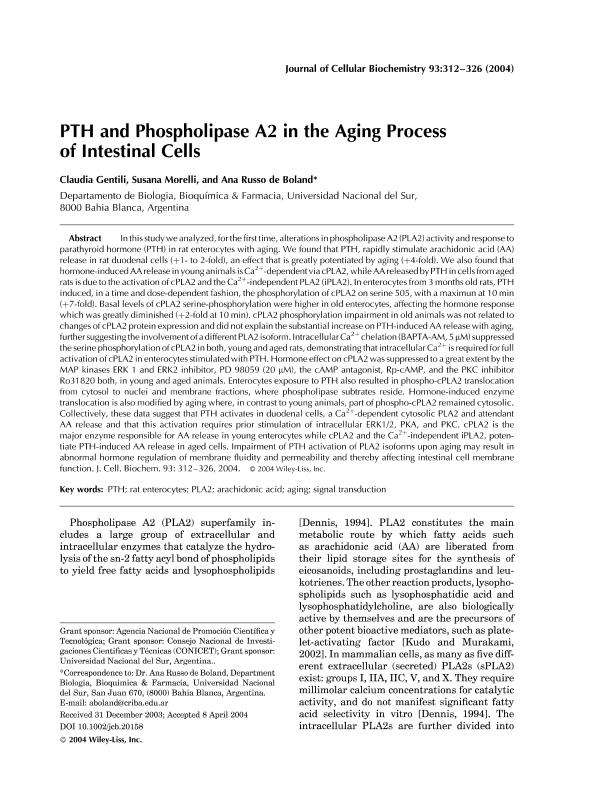Artículo
PTH and phospholipase A2 in the aging process of intestinal cells
Fecha de publicación:
12/2004
Editorial:
Wiley-liss, Div John Wiley & Sons Inc
Revista:
Journal of Cellular Biochemistry
ISSN:
0730-2312
Idioma:
Inglés
Tipo de recurso:
Artículo publicado
Clasificación temática:
Resumen
In this study we analyzed, for the first time, alterations in phospholipase A2(PLA2) activity and response to parathyroid hormone (PTH) in rat enterocytes with aging. We found that PTH, rapidly stimulate arachidonic acid (AA) release in rat duodenal cells (+1- to 2-fold), an effect that is greatly potentiated by aging (+4-fold). We also found that hormone-induced AA release in young animals is Ca2+-dependent via cPLA2, while AA released by PTH in cells from aged rats is due to the activation of cPLA2 and the Ca2+-independent PLA2 (iPLA2). In enterocytes from 3 months old rats, PTH induced, in a time and dose-dependent fashion, the phosphorylation of cPLA2 on serine 505, with a maximun at 10 min (+7-fold). Basal levels of cPLA2 serine-phosphorylation were higher in old enterocytes, affecting the hormone response which was greatly diminished (+2-fold at 10 min). cPLA2 phosphorylation impairment in old animals was not related to changes of cPLA2 protein expression and did not explain the substantial increase on PTH-induced AA release with aging, further suggesting the involvement of a different PLA2 isoform, Intracellular Ca2+ chelation (BAPTA-AM, 5 μM) suppressed the serine phosphorylation of cPLA2 in both, young and aged rats, demonstrating that intracellular Ca2+ is required for full activation of cPLA2 in enterocytes stimulated with PTH. Hormone effect on cPLA2 was suppressed to a great extent by the MAP kinases ERK1 and ERK2 inhibitor, PD 98059 (20 μM), the cAMP antagonist, Rp-cAMP, and the PKC inhibitor Ro31820 both, in young and aged animals. Enterocytes exposure to PTH also resulted in phospho-cPLA2 translocation from cytosol to nuclei and membrane fractions, where phospholipase subtrates reside. Hormone-induced enzyme translocation is also modified by aging where, in contrast to young animals, part of phospho-cPLA2 remained cytosolic. Collectively, these data suggest that PTH activates in duodenal cells, a Ca2+-dependent cytosolic PLA2 and attendant AA release and that this activation requires prior stimulation of intracellular ERK1/2, PKA, and PKC. cPLA2 is the major enzyme responsible for AA release in young enterocytes while cPLA2 and the Ca2+-independent iPLA2, potentiate PTH-induced AA release in aged cells. Impairment of PTH activation of PLA2 isoforms upon aging may result in abnormal hormone regulation of membrane fluidity and permeability and thereby affecting intestinal cell membrane function.
Palabras clave:
AGING
,
ARACHIDONIC ACID
,
PLA2
,
PTH
,
RAT ENTEROCYTES
,
SIGNAL TRANSDUCTION
Archivos asociados
Licencia
Identificadores
Colecciones
Articulos(CCT - BAHIA BLANCA)
Articulos de CTRO.CIENTIFICO TECNOL.CONICET - BAHIA BLANCA
Articulos de CTRO.CIENTIFICO TECNOL.CONICET - BAHIA BLANCA
Citación
Gentili, Claudia Rosana; Morelli, Susana Ana; Russo, Ana Josefa; PTH and phospholipase A2 in the aging process of intestinal cells; Wiley-liss, Div John Wiley & Sons Inc; Journal of Cellular Biochemistry; 93; 2; 12-2004; 312-326
Compartir
Altmétricas




